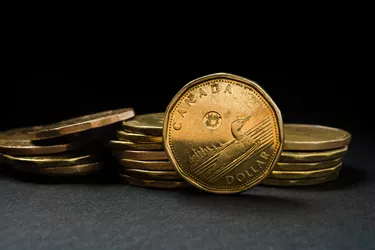Exchanging Canadian bills for their equivalent in U.S. dollars is a fairly straightforward process, but that's not the case with Canadian coins. They're handled much like U.S. coins, meaning they need to be rolled before you exchange them, but finding a bank to accept them could be problematic. How you approach the problem varies, depending whether you have a small quantity left over from vacation or take in Canadian coins constantly at your business.

Video of the Day
The Familiar Coins
Most Canadian coins closely resemble their American equivalents. Pennies, nickels, dimes and quarters are all similar enough to pass unnoticed in a handful of U.S. change, and you might never even notice them until a vending machine refuses to accept one. You can use the same coin rollers for Canadian coins that you'd use for their American equivalents, and count out the same number of each per roll: 50 each for pennies and dimes, and 40 each for nickels and quarters. You can also simply roll them in plain paper if you don't have coin rollers.
Video of the Day
The Exceptions
There are a few differences between Canadian and American coinage, and the most distinctive is Canada's use of coins instead of bills for the $1 and $2 denominations. You won't find American coin rollers in the right size for those coins, known as the "loonie" and "toonie," respectively, so you'll have to either roll them in plain paper or order Canadian coin rollers. They're rolled in quantities of 25 coins, for a total of either $25 or $50 Canadian. The penny, in its way, is also a special case. Canada withdrew the penny from circulation back in 2013, but the coins are still accepted once they make their way back to banks in that country. The only difference is that they're scrapped, instead of going back into circulation.
The Real Problem
The primary issue isn't which coins you have or how you roll them: It's that banks as a rule won't accept foreign coins, including even the Canadian-based TD Bank. The banks most likely to accept Canadian coins are those located in border areas of states such as Washington, Maine, Michigan and New York, where cross-border shopping from Canadians helps drive the local economy. If you're thinking about opening a business in one of those areas, and expect to receive Canadian coinage on a regular basis, it's worth approaching the local banks and seeing what kind of terms you can negotiate. If you just have a few dollars' worth of Canadian coins left over from a vacation, it would hardly be worth the effort.
The Alternatives
The banks most likely to accept your Canadian coins and give back U.S. dollars are, of course, in Canada. If you'll be returning to that country again at any point in the near future, you can simply hang on to your coinage and either spend it or exchange it while you're north of the border. If you run a business in a border area, you can cross or send a trusted employee whenever your accumulation of Canadian coins reaches a worthwhile level. Depending on the quantities of Canadian coin you're dealing with, you may also be able to use a currency exchange service. Travelex doesn't typically accept foreign coins other than Euros, but U.K.-based Leftover Currency will cheerfully accept Canadian coins for a percentage of the exchange rate. You'll need to physically mail the coins to London, but payment returns quickly in the form of a Paypal transfer.